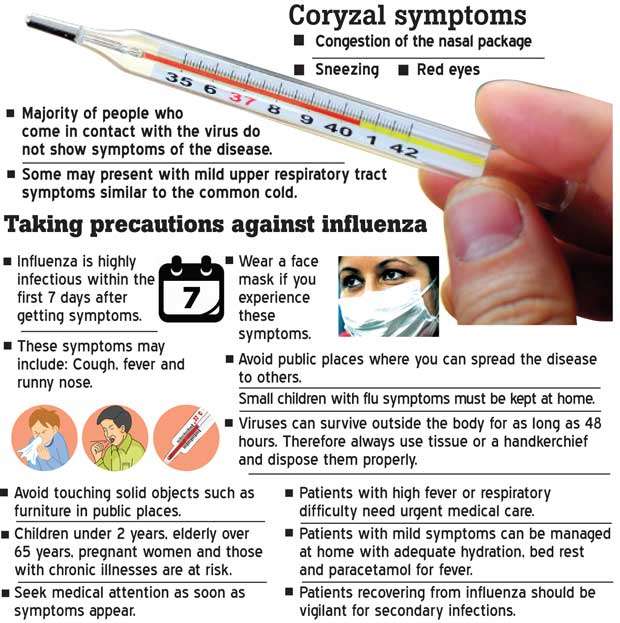01 Jun 2018 - {{hitsCtrl.values.hits}}

 Seasonal Influenza, more commonly known as the flu, has become a hot topic for discussion during the recent months. What exactly is influenza? Is it serious as its reputation claims? If so, what can we do to prevent the spreading of this illness and avoid the complications associated with the disease? Health Capsule consulted Dr. Ganganath Gunathilake, Consultant in Paediatric Respiratory Medicine, to obtain more information on Influenza. “The exact strain of the virus is yet to be established, but according to the symptoms and the global spread of the disease, we suspect this strain to be H3N2,” the doctor said.
Seasonal Influenza, more commonly known as the flu, has become a hot topic for discussion during the recent months. What exactly is influenza? Is it serious as its reputation claims? If so, what can we do to prevent the spreading of this illness and avoid the complications associated with the disease? Health Capsule consulted Dr. Ganganath Gunathilake, Consultant in Paediatric Respiratory Medicine, to obtain more information on Influenza. “The exact strain of the virus is yet to be established, but according to the symptoms and the global spread of the disease, we suspect this strain to be H3N2,” the doctor said.
Transmission
Influenza is a virus known to cause various respiratory infections. It’s usually transmitted through droplets and sometimes directly from the secretions from the respiratory tract. The viruses contained within these secretions lodge in our respiratory tract and attacks our body tissues.

But do all those who get in contact with the virus get the disease? It’s not so, according to Dr. Gunathilake. He said that in fact, the majority of people who come in contact with the virus don’t have symptoms of the disease at all because the body successfully fights the disease. Most of the patients who show symptoms of the disease only have mild upper respiratory tract symptoms which are similar to a common cold.
A number of these patients develops influenza or an influenza like illness. For the disease status to be named ‘influenza’, the patient should have coryzal symptoms associated with high fever. Coryzal symptoms are symptoms like congestion of the nasal package, sneezing and red eyes. Again, a small number of these patients develop lower respiratory tract symptoms which mainly affect the lungs, usually leading to pneumonia. Pneumonia can be complicated and those who are ill may complain of having difficulties in breathing and other associated problems.
Treatment
Influenza is a disease caused by a virus and is usually cured by the body itself (self limiting). Therefore most of the time treatment involves treating the symptoms and making the patient comfortable until the illness is cured, explained the doctor. This includes giving paracetamol for fever, drugs to control the secretions and other supportive treatment including hydration, he elaborated. For patients with severe progressive disease and patients who possess a high risk, antiviral drugs like Oseltamvir are prescribed. These drugs do not kill the virus, but control their numbers by hindering their cell division, the doctor added.
Sometimes patients with severe disease will have severe respiratory difficulties requiring respiratory support like ventillators and ICU care.
The other part of the management of influenza is the prevention and management of secondary respiratory tract infections.

Secondary infections
What are secondary infections? When we talk about influenza it damages the respiratory epithelium. Imagine a coral reef, with finger-like protrusions. Our respiratory epithelium is similar. The protrusions cause the excess secretions to be removed and also play a role in keeping out other pathogens causing disease. When a patient is still recovering from influenza, the respiratory tract hasn’t regained its full capacity to function and other pathogens can enter the respiratory tract and cause illnesses easily. Common pathogens causing secondary pneumonia are Staphylococcus aureus and pneumcoccus, according to Dr. Gunathilake.
A secondary infection should be suspected especially when the fever reappears with a cough after the symptoms have subsided for a few days.
Prevention
How do we prevent the spread of Influenza? Education of the general public regarding prevention is the most important factor when it comes to prevention, stressed the doctor. Being aware and maintaining a good respiratory hygiene can go a long way towards controlling the spread of the disease.
Influenza is highly infectious within the first 7 days after developing the symptoms. When preventing the spread of droplets, it’s important to remember that a cough can carry droplets to a distance of roughly three feet. Therefore, wearing a face mask and avoiding public places are important.
Especially small children, having symptoms, should be kept at home until they (symptoms) subside.
Viruses, which live in body secretions, can survive outside the body for around 48 hours, like in furniture etc. Therefore always use a piece of tissue or a handkerchief and dispose them properly, so that others don’t come into contact with these items. Frequent and correct hand - washing techniques should be followed, especially if you come in contact with a patient. Touching the face after touching solid objects like furniture, especially in public places, should be avoided to minimize the risk of contracting the disease.
Vaccination
Influenza vaccination is currently available only in the private sector. Influenza is an RNA virus with an outer covering of proteins which acts as messengers. These proteins change frequently giving rise to newer virus strains rendering the old vaccines out of date. In developed countries, vaccines are produced annually, according to the prevailing strains, but we have no evidence to suggest that they are the same viruses that cause disease in our country, he explained. He also said that those who want to receive the flu vaccine from the private sector can do so, but with medical advice.
High risk groups
While anyone has a chance of contracting influenza, there are certain groups of people who are more susceptible and can develop a severe disease, stressed the doctor.
Those belonging to the extremes of age-children below 2 years and adults above 65 years of age- can contract the disease more easily. Children suffering from long standing illnesses and the failure of other organs like the kidney or the heart are prone to develop a severe disease. Among the adults, those who are suffering from chronic disease and conditions which cause immune suppression like HIV or patients who are taking anti cancer treatment can develop the disease easily. Pregnant women are also more susceptible to severe disease.
Medical advice
Patients presenting with the symptoms of a common cold usually don’t need medical care, explained the doctor. Good hydration with warm fluid, nutrition and rest can be sufficient for most of these patients to get better.
Dr. Gunathilake advises the public to seek medical help if high fever is present with coryzal symptoms, fever lasts for several days and there is respiratory difficulty at any stage of the illness.
Patients who are in high risk groups should obtain medical help as soon as symptoms appear. Those who are recovering from influenza or influenza like illness should be on alert for secondary infections in the respiratory tract, a persistent cough, a cough with yellow sputum and fever returning after a few days, because as we discussed earlier the secondary infection can cause more harm than influenza itself.
22 Dec 2024 9 hours ago
22 Dec 2024 9 hours ago
22 Dec 2024 22 Dec 2024
22 Dec 2024 22 Dec 2024
22 Dec 2024 22 Dec 2024